Part 3: What Hillsborough means to me
Anfield vice-captain Jamie Carragher, Lord Mayor of Liverpool Steve Rotheram, Ian Ayre, Graeme Sharp, Sheila Coleman and Jim Sharman offer their views 20 years on from the Hillsborough disaster.

JAMIE CARRAGHER, Liverpool FC vice-captain
I must have been 10 or 11 years old when it happened. I was quite young but old enough to understand what was going on. In those days the semi-finals were played on the same day and at the same time, so with me being an Everton fan I was at Villa Park watching Everton play Norwich.
I just remember an announcement at half-time that the Liverpool game had been abandoned. It was before the technology of mobile phones etc so no-one really understood what was going on. It wasn't until we were on our way back to Liverpool that we heard what had really happened on the car radio.
I remember Liverpool's first competitive game after the tragedy was against Everton. I was in the Gwladys Street End that day and I remember having a strange feeling about the match. The result didn't matter. It was just special that the first game was between those two sides and both teams went onto the FA Cup Final that season which was just as fitting.
It is essential that we don't forget those who lost their lives that day. We hold the memorial at Anfield every season, and rightly so. We should never forget. The Hillsborough families have conducted themselves superbly. For people to send family and friends away to a game and for them to not return is a terrible thought. It terrifies you just thinking about it. What those people have gone through is unbelievable and the way they have conducted themselves since is impeccable.
It's hard to believe we are now marking the 20th anniversary of Hillsborough. I just hope the families keep fighting for what they believe in. No-one will ever forget what happened. We will always be there supporting the families by doing everything we can to help.

IAN AYRE, Liverpool FC commercial director
Hillsborough is clearly a big landmark in the club's history and, as someone responsible for the custodianship and the brand of the club, it's a unique part of it all. As well as being a terrible tragedy it forms part of our city's culture. The mention of it evokes all the memories and feelings of the time and how you actually felt as a Scouser and a Liverpool fan.
I wasn't actually at the game. I was in the Navy at the time and planning to listen to it on the radio. I got a call from my Mum to tell me my brother was at Hillsborough. Having seen all the footage afterwards one of the things that struck me was the number of people who had someone there but perhaps didn't lose anyone on the day. There weren't mobile phones back then so there was this big period of time when people just didn't know. It got to about 9pm before my brother finally arrived home and he was somewhat bewildered by the attention he was getting from the family. It felt like such a lifetime before we knew he was okay.
Across the whole of Liverpool families were genuinely affected by knowing someone who was there. For me personally, the experience with my brother made it hit home how difficult it must have been for the families who did ultimately lose someone.
Over the years the club has always tried to be supportive to the families, as has the city. Any fan who loses their life watching Liverpool Football Club has given the ultimate sacrifice. The campaigning that has continued is admirable and shows we will never give up on anything, especially when it comes to the people who were lost.
Hopefully we will get justice one day. For these people to carry on with their day-to-day lives and to do it in the way they have without any closure is admirable.
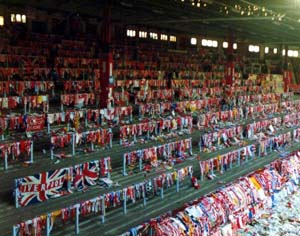
GRAEME SHARP, former Everton player
We were in a semi-final tie at Villa Park against Norwich. It wasn't a great game, but we managed to win it 1-0. As soon as we sat down in the dressing room, news started to filter through that there had been some sort of crowd trouble at Hillsborough. We were quite joyous after our victory, but slowly we began to hear that there had been loss of life in Sheffield. It wasn't until we were on our way home on the bus that we found out more. It was a terrible afternoon. Normally you would enjoy winning a semi-final, but coming back up the motorway, it certainly wasn't the case. It was a very quiet bus and our thoughts were centred on those who had died.
I could understand why some didn't want the FA Cup final to be played. Looking at it, it was probably mapped out that the Reds would win it. It was a memorable occasion. Okay, we didn't win the game, but with everything going on around it, it was a fitting memorial for those who lost their loved ones, that Liverpool picked up the cup.
At the time Kenny Dalglish and all the Liverpool players had to deal with funerals etc and it was a very difficult period for them. You have to take your hat off to Kenny. The Hillsborough tragedy probably played a part in why he eventually resigned.
We (Everton) were affected as well. I remember on the Sunday, Kevin Sheedy and myself went along to a Catholic service at the cathedral. It was very touching. It was an awful time and we did our best to help whenever we could. We visited Anfield as a group of players to show our respects. It was a fantastic scene with all the flowers. We found it hard, but everyone did.
I don't think anyone will ever forget. The first competitive game they played after the tragedy was at Goodison Park and again it was a hugely emotional night. It was hard for the players to return to the pitch, but it also gave them a chance to move on. They would never forget, but it was time to carry on with football.
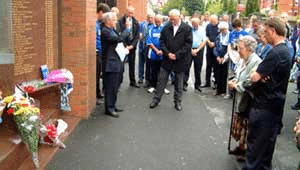
STEVE ROTHERAM, Lord Mayor of Liverpool
The town hall is going to be the focus for a number of different events to mark the 20th anniversary of the Hillsborough disaster.
People can come along and complete the book of remembrance 20 years on and at six minutes past three we will have a two minute silence where the traffic in Liverpool will come to a complete stop. At eight minutes past the municipal bells, the ones in Our Lady and Saint Nicholas church on the waterfront and the two cathedrals will peel 96 times.
We will also be conferring the Freedom of City of Liverpool to the families of the 96 and this will take place during the service at Anfield. It's the highest honour you can confer upon anyone.
The families will come together in the evening and receive individual certificates. This isn't just because of the Hillsborough disaster, but what they have done together since that tragic day. I think it's probably the most poignant thing we could do to recognise the support they gave each other in the months and years afterwards and their continued fight for justice. Quite rightly, those people want the truth.
I've been going to the memorial service for many years and it's probably the day when people's mind focus more than ever on the tragedy that took place 20 years ago. That's why even today it's so well supported.
Two years ago I was asked to take office as the Lord Mayor of Liverpool. One of the first things I did was look in the diary to see if my term of office would stretch beyond the 20th anniversary of Hillsborough. It did, so since then I've been working with different groups to see what mechanisms the council has to help and support the families and make sure we play our part in the recognition.
It is probably THE most poignant and significant date in the history of Liverpool. I'd put it on a par with 1207 when Liverpool received its charter.
I was there back in 1989 and I remember that we made our way to Sheffield and got there 20 minutes before kick off. I just remember it being a glorious day. We'd been there the year before but there didn't seem to be the same order and control. I'd swapped my ticket just before the match to go into the stand above the Leppings Lane and I got into my seat just before kick off. I watched things unfold in a surreal and dream-like state. I remember certain parts of the day vividly but the rest of it seems something of a fog.
The reaction of the whole of Merseyside following that day showed the true spirit of Liverpool as a city. It didn't matter whether you were red or blue or supported any other football team. They just came together and the true characteristics of Scousers came shining through. It was there for all to see, with the images of the pitch, the different coloured scarves and the way people supported each other.

SHEILA COLEMAN, HJC
I always remember the day of Hillsborough because I was down great Homer Street Market with my son. We were walking towards my mother's house and an old man stopped me and said 'Isn't it terrible what's happening'? I asked him what he meant and he said, 'The football'. Right away I thought Liverpool must be losing. But he said 'No, no, people are hurt'. When I got to my mother's I turned on the TV and we watched the disaster unfold. I remember there was a heavy atmosphere in the city because people didn't know who was dead or who was injured.
The next morning the radio station started reading out the names of the dead. I knew people who had been at Hillsborough and I remember feeling relieved when their names weren't read out and at the same time, I felt guilty for feeling that way. Those names were someone's son, someone's daughter, someone's husband or wife.
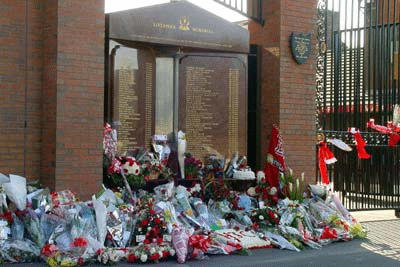
When I think about Hillsborough 20 years on I see the disaster as the unnecessary and avoidable deaths of 96 people. That is what is so tragic. If it hadn't been for the breakdown of police control those deaths would not have occurred. They were totally avoidable. I think Hillsborough is firmly set in the context of British society in the 1980s. It was a time when the ordinary working person was oppressed. The miner's strikes, the poll tax riots etc are examples of this. Football supporters in particular were treated very badly. They were herded to football grounds and penned in like animals. Even the police language at the time involved animal terminology. They spoke about corralling fans from trains to the ground and putting them in pens. Liverpool fans paid the price for that mentality.
The fact it was Liverpool supporters provided an added dimension in the aftermath of Hillsborough because Liverpool had a reputation as a militant city. We had a negative reputation nationally.
I therefore see the history of Hillsborough as a history of a cover-up. The disaster was one thing, with the avoidable deaths of people; but then you had a systematic cover-up of the facts. The fact was, as Lord Justice Taylor pointed out, the cause of the disaster was the breakdown of police control. But by the time he had said that, the cover-up was well under way. Police statements were altered, notebooks and videos went missing, the cover up became strong within the legal system; most notably in the coroners court at the inquest where the true facts of how people died were never explored.
The coroner failed in his duty. In the final inquest he lumped everyone together into a generic inquest, and those 95 deaths as they were then, were treated as one death. Under British law, the dead of Hillsborough were denied their rights because their individual circumstances were not enquired into fully as is their right under the coroner's law.
An indication of the injustice of Hillsborough is the fact that a justice campaign was formed more than eight years after Hillsborough. That said a lot; that people felt so strongly they wanted to mount a proactive campaign so long after it happened. Normally you would expect it to happen in the early stages. What people did back then was put their faith in a legal system that let them down. So the Hillsborough Justice campaign was formed in the late '90s.
Twenty years on from the disaster, that campaign has gone from strength to strength. It hasn't diminished, it's actually stronger. Why is that so? Well, the only conclusion that can be reached is that you can't put a time limit on grief or a time limit on a fight for justice when you feel so aggrieved. It's important that the general public realise that the reason people can't move forward is because there has been no justice. Had people held their hands up at the time I am sure families would have moved on; but because of the lies told, people feel they have to fight for justice for their loved ones, otherwise they are doing them a disservice.
The legal procedures have run their course and failed bereaved families. For me, I think one day, it will be achieved in some measure. Maybe a police officer will break ranks and say what actually happened. It's like the Berlin Wall coming down. It takes a long time but you keep chipping away. Eventually there will be a ruling that states an injustice was carried out at Hillsborough.
One way of doing that, is for the Government to take this feeling of injustice seriously and order a full enquiry into events after 3.15pm on the day of the disaster; and equally important, they should launch an enquiry into how Hillsborough was investigated by the police.
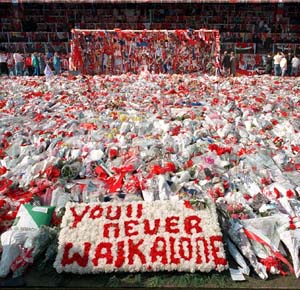
JIM SHARMAN, editor of Hillsborough: Context and Consequences
Hillsborough is obviously a very emotive topic for many different people. My own experience of it began on Church Street on that ill-fated afternoon. I went past a fruit and veg salesman with his radio on. I looked at my watch hand and wondered why they were doing commentary so early because back then it was normally just the second half. I remember hearing distinctly 'We are hearing unconfirmed reports that someone has died.' The feeling was tangible. People just stopped in their tracks. We all know what happened after that. The death toll was increasing minute by minute.
I remember going along with lots of people to Lime Street station to meet the trains coming back. What struck me was how the city galvanised itself and how the people came together and united in grief and support. To me that is what being a Liverpudlian is all about. I've never seen a more vivid example of people coming together and helping each other out. The week after the tragedy when a two minute silence was held on Church Street was another galvanising moment.
Putting together the Context and Consequences work with Nicola McMillan, Hillsborough began to mean different things to me. More than April 15 or the fact 96 people died. Hillsborough became synonymous with injustice.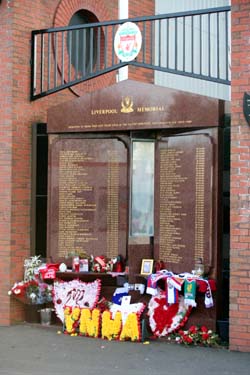 It was a massive miscarriage of justice. When you deal with a culture that is used to being spoon fed the news, it's very hard to counter that, if what is said or printed is not true. Hillsborough has come to represent a struggle for truth and decency. You mention the word Hillsborough in football circles and they all understand what it is, but very few acknowledge who is to blame. Therefore people have assumed it is down to Scouse hooligans. How unfair and ridiculous is that? To label an entire city as drunken hooligans...and not all of those who died were from Liverpool. What does that mean? Does that mean that all Liverpool supporters are drunken hooligans? Where does it stop? If you tolerate it, it becomes the 'norm'.
It was a massive miscarriage of justice. When you deal with a culture that is used to being spoon fed the news, it's very hard to counter that, if what is said or printed is not true. Hillsborough has come to represent a struggle for truth and decency. You mention the word Hillsborough in football circles and they all understand what it is, but very few acknowledge who is to blame. Therefore people have assumed it is down to Scouse hooligans. How unfair and ridiculous is that? To label an entire city as drunken hooligans...and not all of those who died were from Liverpool. What does that mean? Does that mean that all Liverpool supporters are drunken hooligans? Where does it stop? If you tolerate it, it becomes the 'norm'.
From the beginning there have been people prepared to risk a lot, in their concerted campaign for justice. I don't have a name to clear, but I'm a Liverpudlian, a football supporter, and I like to think I am a decent human being. So when a system that comprises various authorities that collaborates and colludes to deny a group of people the very basic human right of truth and justice, there is something fundamentally wrong with our society. That's what Hillsborough has come to mean to me.
Putting this booklet together is my way of contributing to the work that Nicola has done. We've done this to try and have an impact on the consciousness and to say don't settle for the lie - fight for the truth. The document we have brought out is a compilation of facts and important information we think people need to know. It's been put together in as objective a way as we can make it. It outlines the events that lead up to, occur during, and, of course, the consequences thereafter of the Hillsborough football disaster.
There have been other sporting disasters in Britain - Ibrox, Bradford, to name just a couple. But Hillsborough is known as the biggest or the worst disaster in British sporting history. The sheer magnitude of that disaster is still painfully felt to this day, 20 years on.
The thing that upsets me the most is that you have a major event like that in front of dozens of TV cameras, hundreds of journalists, thousands of pictures, tens of thousands of witnesses, and yet in spite of all that evidence and in spite of everything we now know, not one single person has been held accountable for their actions that day.
In his foreword for Context and Consequences Phil Scraton came up with a really good line that I like a lot. It says: 'Regrettably it is necessary to do this, because the myths of Hillsborough live on, leaving the bereaved of the survivors still, after 20 years, defending their reputations and those of their loved ones. In itself, this serves as a reminder that injustice is the tragedy that arose out of the Hillsborough disaster.'
That sums it up pretty well. No accountability, responsibility dodged and an entire city's name dragged through the dirt.

Click here to read part 1 of this feature>>



